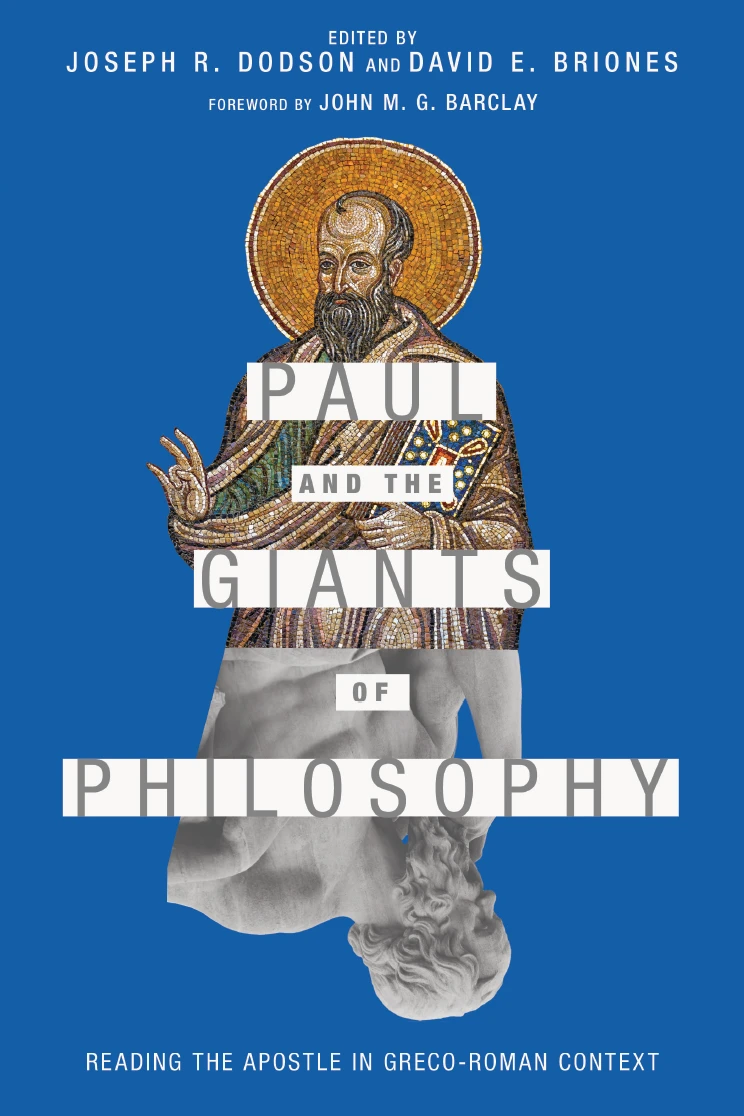
Joseph R. Dodson and David E. Briones, Editors
Reviewed by: S. M. Baugh
Paul and the Giants of Philosophy: Reading the Apostle in Greco-Roman Context, edited by Joseph R. Dodson and David E. Briones. IVP Academic, 2019. Paperback, 200 pages, $14.89 (Amazon). Reviewed by OP minister and professor S. M. Baugh.
C. S. Lewis once wrote that people who want to read about Platonism make the mistake of reading “some dreary modern book ten times as long” about Platonism rather than simply reading Plato himself, a classic author who is still in print for a reason. I have followed this practice throughout my career. Yet, as time permits, some modern works are certainly worth reading or consulting. Which brings us to the book at hand.
Paul and the Giants of Philosophy consists of fourteen brief essays from thirteen authors comparing Paul with various Greek and Roman philosophers ranging over time from Plato and Aristotle to Cicero to Seneca and ending with Epictetus and Plutarch. (See the helpful table of ancient writers referenced in the book with their dates and brief biographical information.) The essays in this collection are all quite short, averaging about a dozen pages each, and they often conclude with a table summarizing the similarities and differences between the chosen philosopher and Paul. The essays close with discussion questions and select bibliography of both primary and secondary literature. The discussion questions show that this collection is aimed primarily at introductory level college students.
With such short chapters, the authors had to be very selective. For example, you will not find a full comparison of Plato or Plutarch with Paul, but selected topics only, including things like suffering (two of the contributions), friendship, faith, the good life, and the afterlife. Even with focused topics, the comparisons cover only one or two writings from each author. For example, in his comparison on the topic of slavery in Paul and Seneca, Timothy Brookins treats Seneca’s Epistle 47 and Paul’s Philemon. This means that the chapter cannot treat all of what Paul has to say on slavery, or, more importantly, what Paul writes to slaves (unlike Seneca who only writes for elites like himself). Nevertheless, despite some necessarily very general statements that could stand expansion or qualification, the author does a good job in the comparison, which can also be said for most of the contributors. The chapter by Randy Richards on Paul, Cicero, and Seneca as letter writers was particularly interesting. Where else are you going to read that Paul’s Romans would have cost him the equivalent of today’s $2,275 to produce?
In a work with such varied contributors, some of whom are obviously less expert in Paul (or in the Greek language) than in their chosen philosopher, I would have to say that overall this is an interesting and worthwhile book for the chosen audience, though it also has some curiosities. For example Justin Allison treats Philodemus’s fragmentary remarks toward his disciples as a sort of “therapy” session because “centuries-old philosophical traditions led immature students out of their emotional and mental illnesses toward health” (21). This is just odd at best. And it gets odder (and bowdlerized) when we are told that Philodemus recommends calling one’s students “kind names like ‘dearest’ and ‘sweetest’” (25).
At its best, this book will inspire its young readers to follow C. S. Lewis’s advice and read ancient philosophers—and Paul!—themselves. And there are many, many other ancient authors and sources that must be reckoned with before one can fulfill the subtitle of this book and “read the apostle in Greco-Roman context.” But this book adds a nice entryway into that world for beginning students.
November 17, 2024
November 10, 2024
Taming the Fingers: Heavenly Wisdom for Social Media
November 03, 2024
Unfolding Redemption: Exploring the History and Order of Salvation
October 27, 2024
You Are Still a Mother: Hope for Women Grieving a Stillbirth or Miscarriage
October 06, 2024
September 29, 2024
September 22, 2024
Christianity and New Religious Movements: An Introduction to the World’s Newest Faiths
© 2024 The Orthodox Presbyterian Church